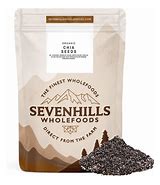✨ Kickstart Your Wellness Journey — Download the Free Detox Guide
The Power of Chia Seeds: Omega-3s, Fibre & Plant-Based Protein Explained
Discover the powerful health benefits of chia seeds, rich in omega-3s, fibre, and plant protein. Support digestion, energy, and heart health naturally with this tiny superfood. Learn how to use chia daily for optimal wellness and balance.
PRODUCT REVIEWS
7/13/20255 min read


Introduction to Chia Seeds
Chia seeds, derived from the Salvia Hispanic plant, are tiny yet nutritionally robust seeds that have garnered significant attention in recent years. Native to Central America, these seeds were a fundamental part of the diet of ancient civilisations such as the Aztecs and Mayans, who valued them for their energy-boosting properties and as a means to sustain long-distance travellers. The word "chia" itself means "strength" in the Mayan language, which aptly reflects the seed's historical importance as a source of nourishment.
In contemporary society, chia seeds have experienced a remarkable resurgence, primarily due to their designation as a superfood. Packed with essential nutrients, they are recognised for their high levels of omega-3 fatty acids, fibre, protein, and various vitamins and minerals. As health-conscious individuals increasingly seek out nutrient-dense food options, chia seeds have become a popular choice in modern diets. Their versatility allows them to be easily integrated into various culinary applications, ranging from smoothies and baked goods to salads and puddings.
The growing popularity of chia seeds is not merely attributed to their nutritional profile but also to their unique properties. When mixed with liquid, chia seeds form a gel-like consistency, which makes them a useful ingredient in gluten-free and vegan recipes. This ability to thicken and bind foods enhances their appeal among those adhering to specific dietary restrictions. Furthermore, chia seeds are lauded for their potential health benefits, which include promoting heart health, aiding digestion, and supporting weight management.
As more individuals embrace the concept of holistic health and well-being, chia seeds have found their place in the diets of people worldwide, solidifying their status as a dietary staple among nutrition enthusiasts. Their origin, historical significance, and modern-day relevance collectively highlight the seeds' remarkable appeal as a health-promoting food.
Nutritional Profile of Chia Seeds
Chia seeds are often lauded for their remarkable nutritional profile, making them a valuable addition to a balanced diet. One of their most notable attributes is the high concentration of omega-3 fatty acids, one of the essential fats particularly beneficial for heart health. These fatty acids are crucial for reducing inflammation and supporting cardiovascular functions, which can play a significant role in lowering the risk of heart disease. In fact, chia seeds are considered one of the richest plant-based sources of alpha-linolenic acid (ALA), a type of omega-3 linked to numerous health benefits.
In addition to omega-3s, chia seeds are an excellent source of dietary fibre. A single ounce of chia seeds delivers approximately 11 grams of fibre, which is instrumental in promoting digestive health. The soluble fibre in chia seeds absorbs water and forms a gel-like substance that aids in maintaining regular bowel movements and managing weight by enhancing the feeling of fullness. This fibre-rich content distinguishes chia seeds from many other common food sources, thereby contributing positively to digestive health and overall wellness.
Moreover, chia seeds are also a noteworthy source of plant-based protein, containing about 4 grams per ounce. This makes them an appealing option for individuals following vegetarian or vegan diets. The protein in chia seeds is complete, meaning it contains all nine essential amino acids required by the body, which is a rarity in plant-based foods. When compared to other protein sources, such as legumes or nuts, chia seeds provide a convenient, versatile option that can easily be incorporated into various meals.
In conclusion, the nutritional profile of chia seeds showcases an impressive array of benefits, particularly their richness in omega-3 fatty acids, fibre, and protein. This unique combination supports not only heart health and digestion but also enhances the overall dietary quality, making chia seeds a noteworthy inclusion in health-conscious diets.
You’ll find a link to the chia seeds we recommend in the description below—check them out!
Health Benefits of Chia Seeds
Chia seeds, scientifically known as Salvia Hispanic, have gained considerable attention for their impressive health benefits. These tiny seeds are packed with essential nutrients that contribute positively to overall well-being. One of the most notable advantages of consuming chia seeds is their contribution to weight management. Due to their high fibre content, they can absorb water and expand in the stomach, promoting a feeling of fullness that may help curb appetite. A study published in the European Journal of Clinical Nutrition found that incorporating chia seeds into a diet may lead to reduced body weight and waist circumference.
Additionally, chia seeds play a significant role in blood sugar regulation. Their unique ability to form a gel-like substance when mixed with liquid can slow down the absorption of sugar, thereby preventing spikes in blood glucose levels. This quality makes chia seeds a wise choice for individuals with diabetes or insulin sensitivity. Research published in the Journal of Nutrition supports this claim, indicating that chia seeds may improve glycaemic control in diabetic patients.
Heart health is another area where chia seeds shine, as they are rich in omega-3 fatty acids, which have been linked to reduced inflammation and lower risk of cardiovascular diseases. The American Heart Association emphasizes the importance of including omega-3 sources in one's diet, and chia seeds can be a plant-based option for those seeking alternatives to fish. Furthermore, the antioxidants found in chia seeds may also help combat oxidative stress, contributing to better heart health.
Lastly, emerging research suggests that chia seeds may exhibit anti-inflammatory properties. Chronic inflammation is a precursor to numerous diseases, and incorporating anti-inflammatory foods like chia seeds may be beneficial for overall health. Testimonials from individuals consuming chia seeds regularly often highlight improvements in energy levels and reduced joint pain.
Incorporating Chia Seeds into Your Daily Meals
Chia seeds are a versatile addition to your diet, offering numerous health benefits while being easy to incorporate into various meals and snacks. One popular method of enjoying these tiny seeds is by preparing chia pudding. To make this simple and nutritious dish, combine three tablespoons of chia seeds with one cup of your choice of milk (dairy or plant-based) and a sweetener, if desired, such as honey or maple syrup. Allow the mixture to sit for at least two hours or overnight in the refrigerator to thicken into a delightful pudding consistency. Experiment with flavours by adding vanilla extract, cocoa powder, or mashed fruits like banana or mango for a nutritious breakfast or snack.
Smoothies are another excellent way to include chia seeds in your diet. Simply blend your favourite fruits, leafy greens, and a tablespoon of chia seeds, creating a nutrient-dense beverage. The seeds will not only enhance the smoothie’s nutritional profile but also add a slight thickness, making it more filling. For savoury meals, consider sprinkling chia seeds over salads or incorporating them into salad dressings for an added crunch and dietary fibre.
For those who enjoy baking, chia seeds can easily be mixed into various recipes. Whether you're making muffins, bread, or pancakes, try adding a tablespoon or two into the batter. Not only do they boost the nutrient content, but they also contribute to the texture. However, it's essential to remain mindful of hydration when consuming chia seeds. When they come into contact with liquids, they expand significantly, so ensure adequate water intake to prevent any digestive discomfort. The recommended daily consumption is about one to two tablespoons of chia seeds, allowing you to enjoy the multitude of benefits they offer safely.
“Ready to try chia for yourself? Grab our favourite organic chia seeds on Amazon today!”
The Vibe Well
The Vibe Well is your go-to space for natural wellness, faceless health courses, and everyday inspiration to feel your best.
© 2025. All rights reserved.


